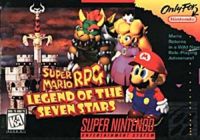Difference between revisions of "Super Mario RPG: Legend of the Seven Stars"
| Line 38: | Line 38: | ||
*It was released for the Japanese Virtual Console in June 2008, and then for the other territories in late August/early September of the same year. In Europe it was released as part of the Hanabi Festival because it had not been originally released for the Super Nintendo there. | *It was released for the Japanese Virtual Console in June 2008, and then for the other territories in late August/early September of the same year. In Europe it was released as part of the Hanabi Festival because it had not been originally released for the Super Nintendo there. | ||
*In 2016, it was released again for the [[Wii U Virtual Console]]. | *In 2016, it was released again for the [[Wii U Virtual Console]]. | ||
| − | *It was among the games included in the [[Super NES Classic Edition]] in | + | *It was among the games included in the [[Super NES Classic Edition]] in 2017. |
=See Also= | =See Also= | ||
Revision as of 07:25, 16 June 2018

| |
| Super Mario RPG: Legend of the Seven Stars | |
| Developer | Squaresoft |
| Publisher | Nintendo |
| System | SNES, Wii Virtual Console, Wii U Virtual Console |
| Release Date | Super NES JP March 9, 1996 US May 13, 1996 Virtual Console JP June 24, 2008 EU August 22, 2008 AU August 22, 2008 US September 1, 2008 Wii U Virtual Console JP August 5, 2015 PAL December 24, 2015 US June 30, 2016 |
| Gallery | GH Gallery |
| Rating | ESRB: E |
Super Mario RPG is a Super NES game which acts as the first roleplaying game in the Super Mario franchise and is also the first Mario game featuring a comprehensive plot. The game was created jointly by Squaresoft, known for their Final Fantasy series, and Nintendo. It blended the 'Mario world with traditional RPG elements and would later inspire two separate Mario RPG series.
Story
The story begins with a seemingly average adventure in which Mario once more battles Bowser in order to rescue Princess Peach. However, the battle is disrupted by a giant sword that falls from the sky and lands in Bowser's Keep. This sends Mario, Peach and Bowser flying in different directions, and it also turns out that the falling sword split the wish-granting Star Road into seven star pieces.
With this sword comes a new group of enemies called the Smithy Gang who quickly begin infiltrating and conquering parts of the Mushroom Kingdom. Mario embarks on a quest to defeat them and gather the Seven Star Pieces before the Smithy Gang do, in order to save the world's wishes from falling into evil hands. Along the way, he seeks out the missing Princess Peach and also comes to meet new allies, Mallow and Geno.
Gameplay
Made by Square Soft, the people behind many popular RPG series, this game combines RPG strategy with timing skill. Instead of simply choosing an attack, watching your character perform it and then watching your character take damage from the enemy, with timed hits you can press buttons at the right times to add more power to your attack or decrease the power of enemy attacks. There are also a plethora of entertaining minigames- like rolling down Midas River, racing Yoshis and chasing bearded men up hills.
Another landmark of this game is that both the princess and Bowser are playable after they join your party. It's noteworthy to see Bowser playable in the game. Although Peach was playable in the American Super Mario Bros. 2, this is the first time you can play as Bowser. Mario's other two teammates are original characters- Geno the possessed doll and Mallow the weather wizard who thinks he's a frog.
One of the last Mario games for the Super NES, this features some of the system's best and most realistic graphics, aided by the SA-1 chip. It also has a variety of memorable music. There are also comical elements to the game that prevent the plumber from becoming too serious.
Legacy
Despite being the original Mario RPG, no official sequel has been made. Instead, two other Mario RPGs were later made that each spawned their own respective subseries: Paper Mario and Mario & Luigi: Superstar Saga. The former was originally made with the working title of Super Mario RPG 2 before it became its own distinct game. Despite their differences, these RPGs do incorporate some elements from Super Mario RPG, such as the timed hits and humor.
The reason this game has no sequel and most characters have failed to reappear is that Square Soft held the rights to all original elements of the game and shortly afterwards started making games for the Playstation instead. Squaresoft and Nintendo have begun working together in following years, but there has never been any sign of a Super Mario RPG follow-up beyond a small cameo appearance made by Geno in the first Mario & Luigi game.
Ports and Remakes
- It was released for the Japanese Virtual Console in June 2008, and then for the other territories in late August/early September of the same year. In Europe it was released as part of the Hanabi Festival because it had not been originally released for the Super Nintendo there.
- In 2016, it was released again for the Wii U Virtual Console.
- It was among the games included in the Super NES Classic Edition in 2017.
See Also
- Characters in Super Mario RPG: Legend of the Seven Stars
- Equipment in Super Mario RPG: Legend of the Seven Stars